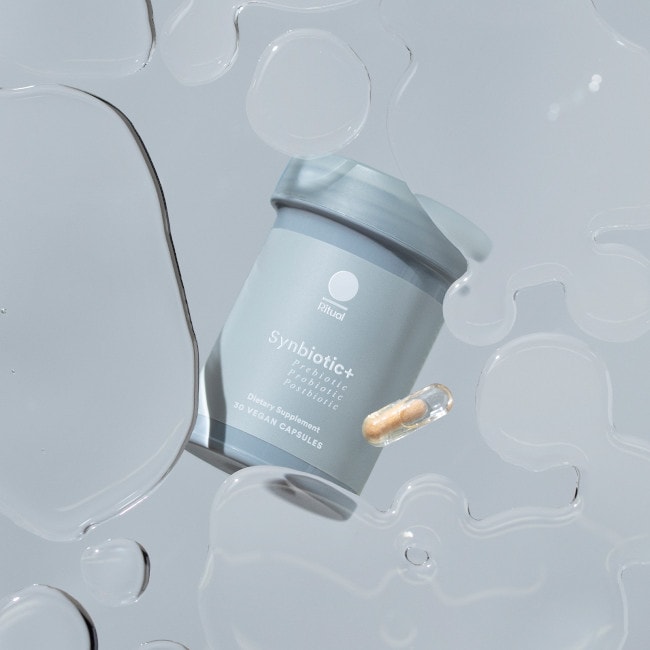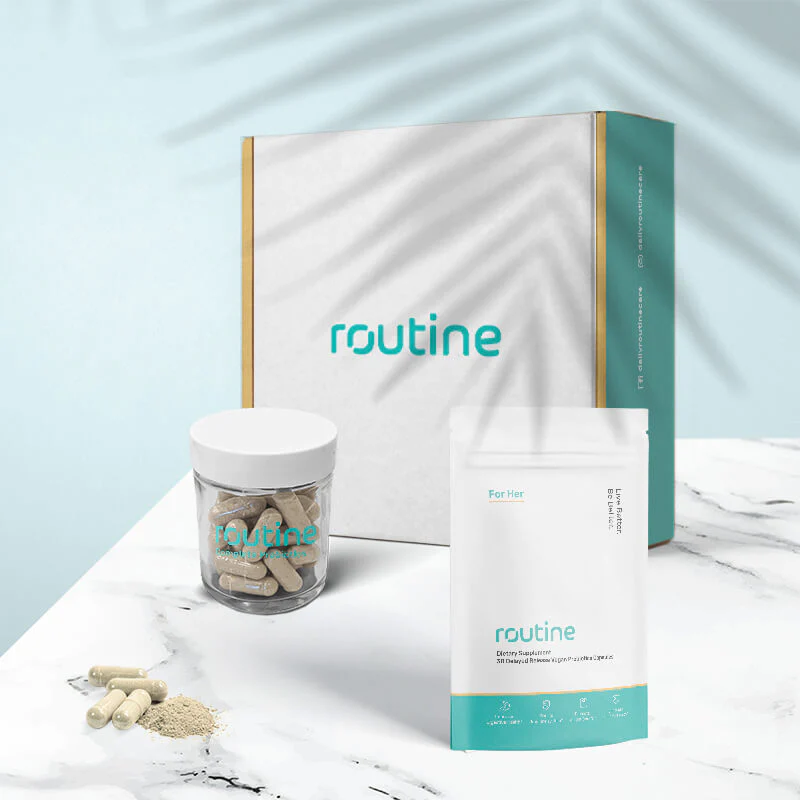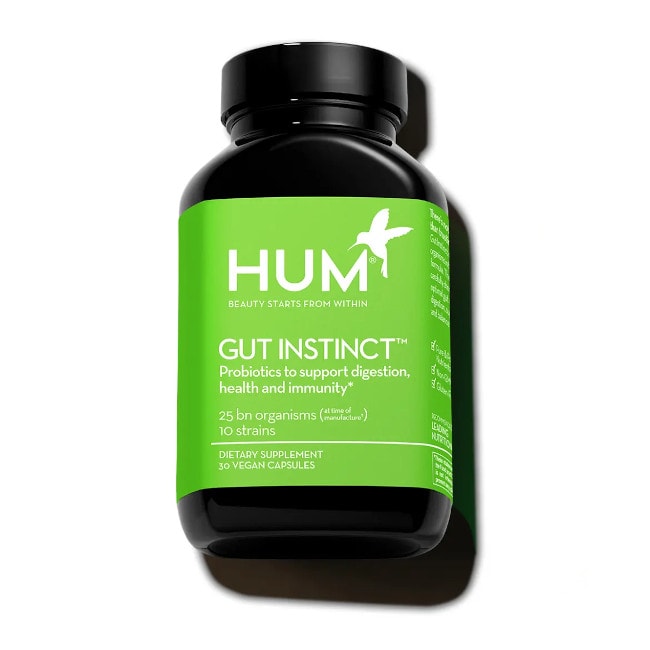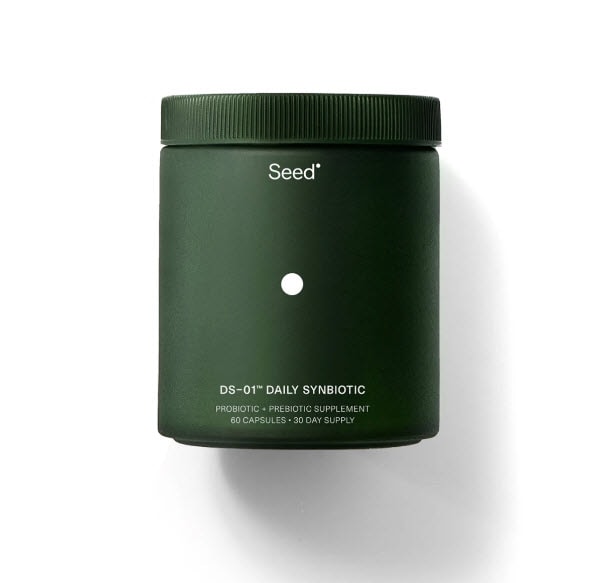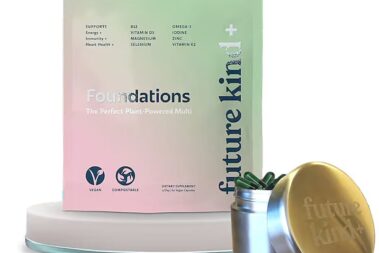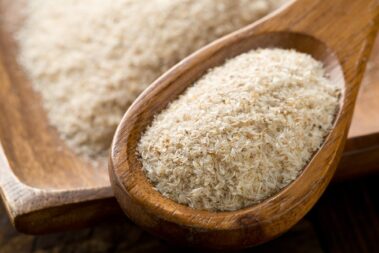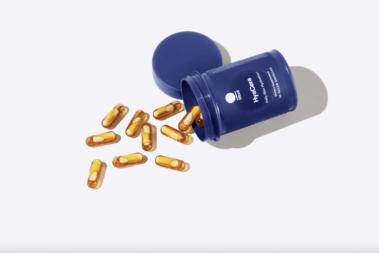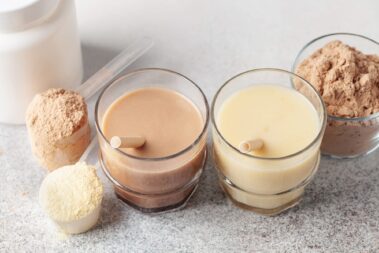Researchers estimate that for every human cell we have, we also have one microbial cell in or on our bodies (1).
It’s no surprise, then, that this micro-ecosystem can have a huge impact on our health. At a time when many factors of our fast-paced lives are damaging to our microbiome, probiotic supplements have become a popular way to help maintain or recapture a healthy gut microbiome. But there are so many options it can be difficult to choose the right one.
Here, we’ll review the best vegan-friendly probiotic supplements and foods, along with some general information about choosing the best one for you.
(As always, though, we recommend speaking to a trusted healthcare professional if you have any questions or concerns.)
Table of Contents
Our Picks at a Glance
- Best Overall: Ritual Synbiotics
- Best for Women: Routine for Her
- Best Value: Future Kind+ Vegan Probiotic
- Best for Men: Garden of Life Raw Probiotics for Men
- Best Subscription: HUM Nutrition Gut Instinct
- Best Synbiotic: Seed DS-01 Daily Synbiotic
What Are Probiotics and What Do They Do?
Probiotics are live bacteria that can help to promote a healthy gut microbiome. Over the past several years, probiotic supplements have gotten really popular — and for good reason too.
We’ve learned a great deal about the gut microbiome and how it affects overall health in expected and unexpected ways. A healthy balance of microbes in your gut can help improve your digestion, yes, but it also regulates your metabolism, immune health, inflammatory response, brain function, mental health, and more (2, 3, 4, 5).
Additionally, your gut bacteria also produce essential nutrients as they break down material in the colon (6).
Unfortunately, several aspects of our modern lifestyles can be detrimental for our gut bacteria — like poor sleep, stress, artificial sweeteners, processed food, and pro-inflammatory oils. So, many of us may not have microbial populations that are as optimally healthy as they could be (7, 8, 9).
Overall, the importance of a healthy, diverse, and flourishing gut microbiome can’t be overstated.
That’s why a lot of us may benefit from taking a probiotic supplement. Probiotics aren’t only found in probiotic supplements, though — they’re also found in foods like kimchi and yogurt. Below, we’ll discuss our recommendations for the best vegan probiotic supplements and our favorite plant-based probiotic foods.
What to Look for In a Vegan Probiotic Supplement
Most probiotic supplements are vegan, so you may not necessarily need to seek out one made specifically for vegans. Still, it’s worth a quick glance at the ingredients list to make sure there are no non-vegan ingredients.
For probiotic supplements, you want to find one containing at least 5 billion colony forming units (CFU) per serving. This number is an estimate of how many live bacteria are present in each serving of the supplement.
If you want a probiotic for a specific condition or symptom, you may also want to look into which specific bacterial strains are beneficial. A review of this is way out of the scope of this article, but it’s important to know that the strains of bacteria matter if you’re looking for a probiotic to help with a specific problem or condition.
Additionally, seek out products with third-party testing, or that come from reputable brands with good reviews for the product as well as for customer service. Third-party testing is the most ideal, because it provides independent verification confirming what’s in the bottle matches what’s on the label.
Now, let’s dive into our six top picks.
Best Probiotic Supplements for Vegans
1. Best Overall: : Ritual Synbiotic+
11 billion CFU per serving
Synbiotics contain both probiotics and prebiotics. However, Ritual’s Synbiotic+ also contains postbiotics, which are beneficial compounds produced by microbial activity. Its capsule-in-capsule design features a capsule of probiotics encased within the capsule of prebiotics, and helps ensure the probiotic survives through the acidic stomach environment and digestive enzymes released in the small intestine so it’s able to reach the large intestine, where it’s most beneficial.
Although this supplement only contains two strains of bacteria, L. rhamnosus and Bifidobacterium animalis ssp. lactis, they are two of the most comprehensively researched strains. They offer immune support and digestive health benefits, and all of Ritual’s products are third-party tested (10, 11).
A serving consists of one capsule per day, and subscribing is optional — although it does unlock free shipping. You can also bundle multiple products per month for additional savings.
Note: I currently write articles for Ritual’s blog. This did not influence our decision to include Ritual in this post, as choosing these supplements was a collaborative effort between myself and other members of the Clean Green Simple team who do not work with Ritual.
2. Best for Women: Routine for Her
24 billion CFU per serving
Routine for Her, from the brand Routine, is a probiotic supplement for overall wellness that contains five unique strains, plus the relaxation-promoting herb ashwagandha. Although men can take the supplement as well, two of the probiotics strains it contains — Lactobacillus rhamnosus HN001 and Lactobacillus acidophilus La-14 — support the health of the vaginal microbiota, hence the name “Routine for Her” (12, 13).
In addition to these vaginal health benefits, the other strains in Routine for Her may help support digestive health, immune health, and metabolic health. However, Routine for Her isn’t third-party tested. It has excellent customer reviews, though.
Routine for Her consists of just one capsule per day, and they offer a cost-saving, optional monthly subscription program. Purchase a 2 month’s supply and save $30. Try Routine risk free with a one time purchase. 2 day free shipping always.
3. Best Value: Future Kind+ Vegan Probiotic
30 billion CFU per serving
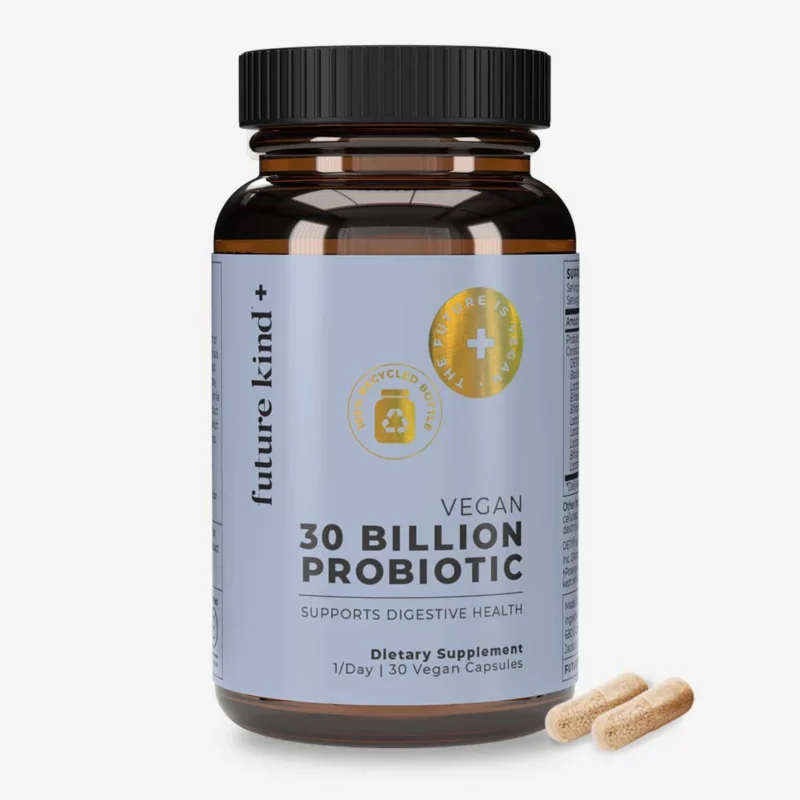
Future Kind+ is a 100% vegan brand offering a variety of supplements, including this high potency probiotic boasting 30 billion CFU per serving for a low price when compared to similar probiotics.
It contains 10 different strains to help support gut health, metabolism, and immune health — including Bacillus subtilis DE111. B. subtilis DE111 may offer heart protective benefits by improving endothelial function (which helps prevent constriction of the blood vessels). This probiotic is also third-party tested (14).
You only need to take one capsule per day, and Future Kind+ offers a 20% discount on subscription orders.
4. Best for Men: Garden of Life Raw Probiotics for Men
85 billion CFU per serving

Garden of Life RAW Probiotics for Men is a comprehensive supplement that contains a multivitamin, a high-dose probiotic, and digestive enzymes. As a male-focused probiotic, it contains ingredients that may support heart health, stress management, and prostate health.
For example, some strains of probiotics have been shown to help reduce levels of harmful, inflammatory pathogens in men’s urine. This could potentially impact urinary tract health and prostate health, although more research is needed (15).
Garden of Life RAW Probiotics for Men is also third-party tested and non-GMO. A serving consists of 3 capsules.
5. Best Subscription: HUM Nutrition Gut Instinct
25 billion CFU per serving
HUM Nutrition is a supplement company that offers personalized recommendations based on your unique health needs and goals. Their products are third-party tested and they employ registered dietitians in research, development, and customer education roles to ensure their practices are evidence-based.
This supplement is low in cost compared to others, and contains 10 different probiotic strains to support immune health and digestive health. Gut Instinct also has excellent reviews, with many reviewers reporting it was the first probiotic that made a noticeable difference for them.
A serving consists of one capsule per day, and HUM offers a number of cost-saving subscription options if you purchase multiple products.
If supplements aren’t your thing, you can still have your probiotics and eat them too. Some research shows that fermented foods may not survive through the stomach as well as probiotics can, and therefore aren’t as beneficial. However, it’s still a great idea to include these foods in your diet regularly (16).
6. Best Synbiotic: Seed DS-01™ Daily Synbiotic
53.6 billion active fluorescent units (AFU) per serving
Seed’s DS-01 is a synbiotic supplement, meaning it contains both probiotics (live bacteria) and prebiotics (food for live bacteria). Like Ritual’s Synbiotic+, it features a capsule-within-a-capsule design to ensure that the probiotics reach your large intestine, where they will offer the most benefit.
It contains 23 different strains of probiotics, including blends for digestive health, skin health, heart health, and micronutrient synthesis. Additionally, DS-01 is third party tested and the potency is measured in active fluorescent units (AFU) rather than CFU. AFU is thought to be more accurate, although CFU is still used by a vast majority of probiotics brands (17, 18).
One serving consists of 2 capsules, and Seed requires a monthly recurring subscription to purchase.
Vegan Foods That Have Probiotics
Let’s review some of the best vegan food sources of probiotics.
Natto
Natto is made from fermented whole soybeans. The fermentation process allows bacteria to grow and flourish. Unlike tempeh, which is also made from fermented soy, natto is usually uncooked and served cold or at room temperature — meaning the probiotics from the fermentation process are still alive when you eat it.
One thing to be aware of though, is that natto has a very strong and distinct smell and taste, as well as a stringy texture. For most people, it’s an acquired taste.
Kimchi and Sauerkraut
Kimchi and sauerkraut are both made from fermented cabbage. Kimchi originated in Korea and is typically spicy and packed with flavor, while sauerkraut is from central Europe and typically features slightly more subdued flavors.
Both kimchi and sauerkraut are loaded with probiotics, if you make them yourself or purchase them from the refrigerated section. Shelf-stable kimchi and sauerkraut are widely available, but they’ve been heat-sterilized — so all of the bacteria (including the good bacteria) is killed off.
Pickles
Pickles are typically made from cucumbers, but many different veggies can be pickled — like okra, peppers, beets, carrots, cherry tomatoes, and more. If you purchase pickles from the refrigerated section of the grocery store, they contain live probiotics. Fermented pickles are also one of the easiest things to learn to ferment yourself.
Plant-based Yogurt
There are tons of plant-based yogurt options available, and all of them contain live probiotics just like traditional yogurt. The difference with plant-based yogurt is that these bacteria aren’t the result of fermentation, but instead they’re added in during processing.
In fact, many homemade vegan yogurt recipes will have you open a probiotic capsule and mix the contents into your plant-based yogurt base to add live cultures.
Kombucha and Water Kefir
Kombucha and water kefir are naturally-fermented beverages.
Kombucha is made from fermented tea, and may contain various fruits, teas, or sweeteners for flavor. Thanks to the fermentation, it’s slightly fizzy. If you see cloudiness at the bottom, that’s the good stuff — the bacteria!
Kefir is similar, but made with sugar, fruit, and water rather than tea. Like kombucha, it’s a little bit fizzy. You can buy both of these at many health food stores, or you can fairly easily make some at home with a few basic supplies.
The Difference Between Prebiotics and Probiotics
Prebiotics, probiotics, postbiotics, synbiotics — that’s a whole lot of “biotics,” and they all mean different things. Although they are all centered around promoting the health of your gut microbiome, each type contains different compounds and works a bit differently. Let’s review those differences briefly.
- Prebiotics: Prebiotics are food for the healthy bacteria in your gut. It’s important to feed them so they can continue to multiply, and there are certain prebiotics that can selectively nourish certain beneficial bacteria strains. You can buy prebiotic supplements, but fiber-rich fruits, veggies, and grains are also naturally good sources of prebiotics (19).
- Probiotics: Probiotics, as we’ve already discussed, are the live bacteria themselves.
- Postbiotics: Postbiotics refer to the end products that are produced by healthy gut bacteria. In your large intestine, your gut bacteria produce short-chain fatty acids, as well as vitamins like vitamin K2, and other health-promoting compounds as they digest fiber and prebiotics. Postbiotic supplements contain these byproducts, rather than live bacteria or prebiotics (6, 19).
- Synbiotics: Synbiotics contain both probiotics and prebiotics, and many contain postbiotics too.
Probiotics vs. Digestive Enzymes
Probiotics and digestive enzymes can both help with digestive health, but they are vastly different types of supplements.
Probiotic supplements are made from live bacteria. These bacteria can help populate your large intestine with beneficial colonies that promote improved digestion and overall wellness.
On the other hand, digestive enzymes are chemical compounds that help break down food. They are non-living, and in supplements may be from a natural source or made in a lab. One of the most well-known digestive enzymes is lactase, which breaks down the sugar lactose found in milk. People with lactose intolerance are deficient in this enzyme and must supplement with it when they have dairy products (20).
Probiotic FAQs
The best time to take a probiotic supplement is when it’s most convenient for you. Most of them can be taken with or without food,so it’s best to choose a time of day when it’s easiest for you to remember to take them — for instance, with breakfast, with other supplements or medications, or after you brush your teeth in the morning.
Most probiotics are designed to be taken daily. Although there haven’t been any extended safety trials, existing research indicates it’s safe to take them long-term (for multiple years) as well.
This can depend on several factors, like your current health, how consistently you’re taking the supplement, what strains are in the probiotic supplement, how many live probiotic bacteria are in it, etc. Most people need to take a probiotic consistently for at least 2 weeks before they feel a difference.
Yes, you can. In fact, it is recommended to help protect and replenish populations of healthy bacteria in your large intestine. Most antibiotics aren’t targeted, so they destroy bacteria indiscriminately — including good and bad bacteria.
Researchers have also found that taking probiotics while on a course of antibiotics, at least in a hospital setting, may help reduce your risk of acquiring illnesses caused by antibiotic-resistant bacteria (21).
CFU stands for “colony forming unit.” It’s an estimation of how many individual living bacterial cells are in a serving of a probiotic supplement. On probiotics labels, you may typically see numbers like 5 billion CFU up to 50 billion CFU per serving.
More Ways to Improve Your Gut Health
Looking for more ways to support optimal gut health? Check out these articles:
- Psyllium Husk: A Natural Weight Loss Supplement
- 11 Best Green Powders to Revitalize Your Health
- Hydrate Smarter: 7 Best Functional Beverages
- Does Vegan Yogurt Have Probiotics?
- 10 Essential Vitamins and Supplements for Vegans and Vegetarians
If you enjoy these vegan tips and product recommendations, be sure to sign up for our newsletter.
What Is the Best Vegan Probiotic?
In our opinion, the best vegan probiotic is Ritual Synbiotic+. This unique supplement contains pre-, pro-, and post-biotics to ensure more of these microbes make it safely to your intestines with the tools they need to thrive.
What is your favorite probiotic supplement? Let us know in the comments section below.
- Boost Your Defenses Against the Flu with These Simple Strategies - November 14, 2023
- Psyllium Husk: A Natural Weight Loss Supplement - November 11, 2023
- A Beginner’s Guide to Microgreens - August 22, 2023


